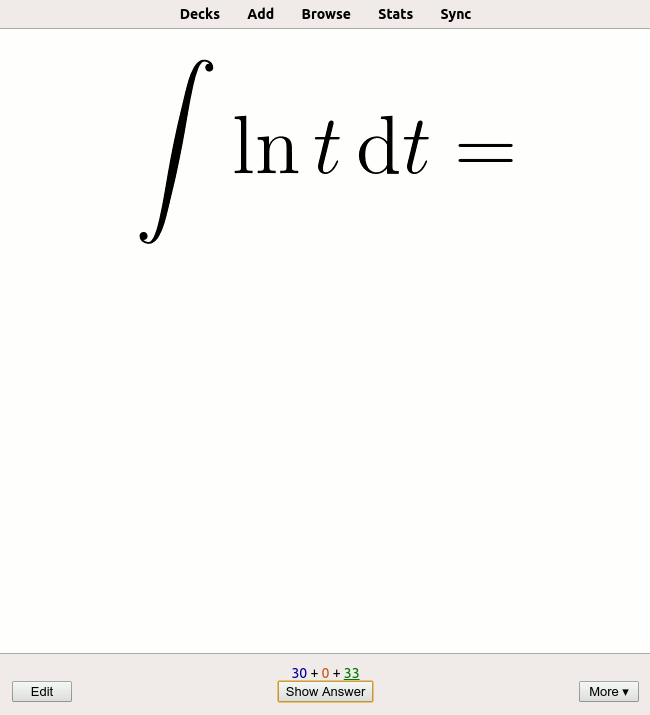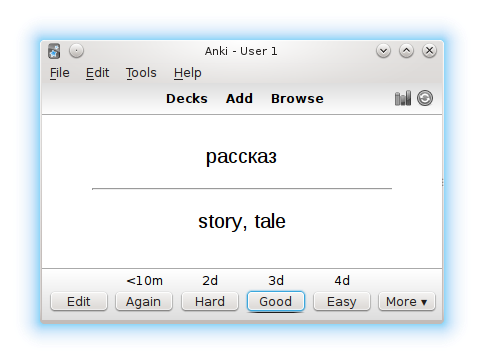|
Leitner System
The Leitner system is a widely used method of efficiently using flashcards that was proposed by the German science journalist Sebastian Leitner in the 1970s. It is a simple implementation of the principle of spaced repetition, where cards are reviewed at increasing intervals. Method In this method, flashcards are sorted into groups according to how well the learner knows each one in Leitner's learning box. The learners try to recall the solution written on a flashcard. If they succeed, they send the card to the next group. If they fail, they send it back to the first group. Each succeeding group has a longer period before the learner is required to revisit the cards. In Leitner's original method, published in his book ''So lernt man Lernen'' (How to learn to learn), the schedule of repetition was governed by the size of the partitions in the learning box. These were 1, 2, 5, 8, and 14cm. Only when a partition became full was the learner to review some of the cards it conta ... [...More Info...] [...Related Items...] OR: [Wikipedia] [Google] [Baidu] |
Flashcard
A flashcard or flash card (also known as an index card) is a card bearing information on both sides, which is intended to be used as an aid in memorization. Each flashcard bears a question on one side and an answer on the other. Flashcards are often used to memorize vocabulary, historical dates, formulas or any subject matter that can be learned via a question-and-answer format. Flashcards can be virtual (part of a flashcard software), or physical. Flashcards are an application of the testing effect − the finding that long-term memory is increased when some of the learning period is devoted to retrieving the information through testing with proper feedback. Study habits affect the rate at which a flashcard-user learns, and proper spacing of flashcards has been proven to accelerate learning. A number of spaced repetition software programs exist which take advantage of this principle. Use Flashcards exercise the mental process of active recall: given a prompt (the questio ... [...More Info...] [...Related Items...] OR: [Wikipedia] [Google] [Baidu] |
Spaced Repetition
Spaced repetition is an evidence-based learning technique that is usually performed with flashcards. Newly introduced and more difficult flashcards are shown more frequently, while older and less difficult flashcards are shown less frequently in order to exploit the psychological spacing effect. The use of spaced repetition has been proven to increase the rate of learning. Although the principle is useful in many contexts, spaced repetition is commonly applied in contexts in which a learner must acquire many items and retain them indefinitely in memory. It is, therefore, well suited for the problem of vocabulary acquisition in the course of second-language learning. A number of spaced repetition software programs have been developed to aid the learning process. It is also possible to perform spaced repetition with flashcards using the Leitner system. Alternative names for spaced repetition include spaced rehearsal, expanding rehearsal, graduated intervals, repetition spacing ... [...More Info...] [...Related Items...] OR: [Wikipedia] [Google] [Baidu] |
Leitner System Alternative
Leitner is an Austrian-German surname. Notable people with the surname include: * Alan Leitner (born 1947), American artist *Aloysius Leitner, United States Marine Corps * Anton G. Leitner (born 1961), German writer and publisher * Dummy Leitner (1872–1960), American baseball player *Edward Frederick Leitner (1812–1838), German physician and botanist *Erika Leitner, Italian luger * Ferdinand Leitner (1912–1996), German conductor * Franz Leitner (motorcyclist) (born 1968), Austrian motorcycle speedway rider *Franz Leitner (politician) (1918–2005), Austrian politician * Friedrich Leitner (1874–1945), German economist *Gottlieb Wilhelm Leitner (1840–1899), Anglo-Hungarian orientalist * Hias Leitner (born 1935), Austrian alpine skier * Jan Leitner (born 1953), Czech athlete *Karl Leitner (born 1937), Austrian sprint canoer *Karl Gottfried von Leitner (1800–1890), Austrian writer * Ludwig Leitner (1940–2013), West German alpine skier * Miroslav Leitner (born 1966), Slovak ... [...More Info...] [...Related Items...] OR: [Wikipedia] [Google] [Baidu] |
Leitner System
The Leitner system is a widely used method of efficiently using flashcards that was proposed by the German science journalist Sebastian Leitner in the 1970s. It is a simple implementation of the principle of spaced repetition, where cards are reviewed at increasing intervals. Method In this method, flashcards are sorted into groups according to how well the learner knows each one in Leitner's learning box. The learners try to recall the solution written on a flashcard. If they succeed, they send the card to the next group. If they fail, they send it back to the first group. Each succeeding group has a longer period before the learner is required to revisit the cards. In Leitner's original method, published in his book ''So lernt man Lernen'' (How to learn to learn), the schedule of repetition was governed by the size of the partitions in the learning box. These were 1, 2, 5, 8, and 14cm. Only when a partition became full was the learner to review some of the cards it conta ... [...More Info...] [...Related Items...] OR: [Wikipedia] [Google] [Baidu] |
Sebastian Leitner
Sebastian Leitner (1919 in Salzburg – 1989) was a German commentator and science popularizer. As a student in Vienna, he was briefly kept in custody by the Nazis in 1938 because of his opposition to the annexation of Austria into Greater Germany. Later he moved to Frankfurt to study law, but he was recruited by the Wehrmacht in 1942. After spending several years in a Soviet POW camp, he returned to Germany in 1949 and started a career as a commentator. His wife was the Austrian journalist and author Thea Leitner. At first, he focused on legal and sociological topics, but later he took medical and psychology-related subjects as his theme. His book ''So lernt man lernen'' (How to learn to learn), a practical manual on the psychology of learning, became a bestseller. In this often-cited book he described his Leitner System which uses flashcards for accelerated and increased learning by spaced repetition Spaced repetition is an evidence-based learning technique that is us ... [...More Info...] [...Related Items...] OR: [Wikipedia] [Google] [Baidu] |
Leitner System Animation
Leitner is an Austrian-German surname. Notable people with the surname include: * Alan Leitner (born 1947), American artist *Aloysius Leitner, United States Marine Corps * Anton G. Leitner (born 1961), German writer and publisher * Dummy Leitner (1872–1960), American baseball player *Edward Frederick Leitner (1812–1838), German physician and botanist *Erika Leitner, Italian luger *Ferdinand Leitner (1912–1996), German conductor * Franz Leitner (motorcyclist) (born 1968), Austrian motorcycle speedway rider *Franz Leitner (politician) (1918–2005), Austrian politician *Friedrich Leitner (1874–1945), German economist *Gottlieb Wilhelm Leitner (1840–1899), Anglo-Hungarian orientalist *Hias Leitner (born 1935), Austrian alpine skier * Jan Leitner (born 1953), Czech athlete *Karl Leitner (born 1937), Austrian sprint canoer *Karl Gottfried von Leitner (1800–1890), Austrian writer *Ludwig Leitner (1940–2013), West German alpine skier * Miroslav Leitner (born 1966), Slovak ski ... [...More Info...] [...Related Items...] OR: [Wikipedia] [Google] [Baidu] |
Computer-assisted Language Learning
Computer-assisted language learning (CALL), British, or Computer-Aided Instruction (CAI)/Computer-Aided Language Instruction (CALI), American, is briefly defined in a seminal work by Levy (1997: p. 1) as "the search for and study of applications of the computer in language teaching and learning".Levy M. (1997) ''CALL: context and conceptualisation'', Oxford: Oxford University Press. CALL embraces a wide range of information and communications technology applications and approaches to teaching and learning foreign languages, from the "traditional" drill-and-practice programs that characterised CALL in the 1960s and 1970s to more recent manifestations of CALL, e.g. as used in a virtual learning environment and Web-based distance learning. It also extends to the use of corpora and concordancers, interactive whiteboards,Schmid Euline Cutrim (2009) ''Interactive whiteboard technology in the language classroom: exploring new pedagogical opportunities'', Saarbrücken, Germany: VD ... [...More Info...] [...Related Items...] OR: [Wikipedia] [Google] [Baidu] |
List Of Flashcard Software
This article contains a list of notable flashcard software. Flashcards are widely used as a learning drill to aid Memory, memorization by way of spaced repetition. Software Platform support References [...More Info...] [...Related Items...] OR: [Wikipedia] [Google] [Baidu] |
Learning Methods
Learning is the process of acquiring new understanding, knowledge, behaviors, skills, values, attitudes, and preferences. The ability to learn is possessed by humans, animals, and some machines; there is also evidence for some kind of learning in certain plants. Some learning is immediate, induced by a single event (e.g. being burned by a hot stove), but much skill and knowledge accumulate from repeated experiences. The changes induced by learning often last a lifetime, and it is hard to distinguish learned material that seems to be "lost" from that which cannot be retrieved. Human learning starts at birth (it might even start before in terms of an embryo's need for both interaction with, and freedom within its environment within the womb.) and continues until death as a consequence of ongoing interactions between people and their environment. The nature and processes involved in learning are studied in many established fields (including educational psychology, neuropsycholo ... [...More Info...] [...Related Items...] OR: [Wikipedia] [Google] [Baidu] |


